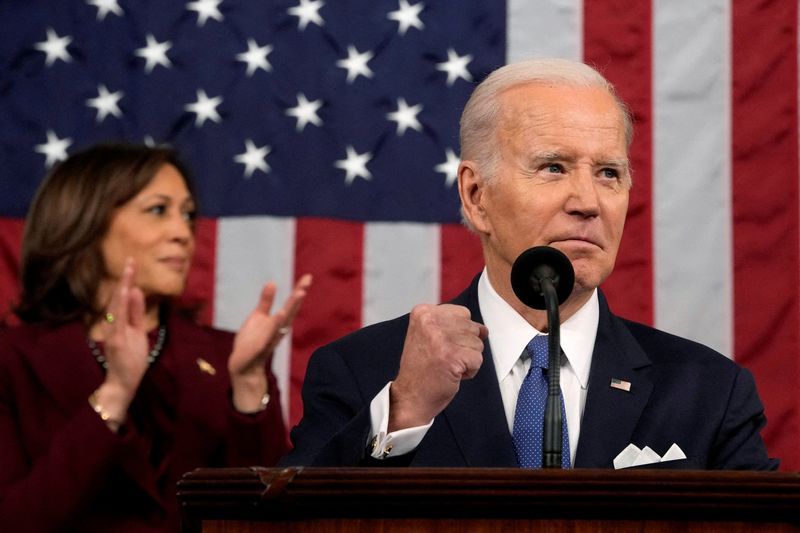Investing.com -- The volatile U.S. political situation took another turn, with President Joe Biden dropping out of race for re-election. China has attempted to boost its struggling economy but cutting interest rates, while Nvidia is developing an AI chip for the Chinese market.
1. Biden bows out of presidential race; Harris to replace?
President Joe Biden on Sunday bowed to what seemed inevitable, and dropped out of the race for re-election amid concerns about his age and health.
Biden backed his Vice President Kamala Harris for the job, putting her in pole position for the nomination which is officially scheduled for the Democratic convention on Aug. 19-22.
"My intention is to earn and win this nomination," Harris said in a statement. "I will do everything in my power to unite the Democratic Party — and unite our nation — to defeat Donald Trump."
This talk of unity could see the party consider a virtual nomination ahead of the convention, and Democratic National Committee Chair Jaime Harrison said the party would soon announce the next steps in its nomination process.
Goldman Sachs (NYSE:GS) in a note said they did not expect the Democrats' fiscal and trade policy agenda to shift meaningfully in the event that Harris is the nominee.
Harris could consolidate Black support and bring into sharper focus the differences between the two sides on abortion rights, an issue that has proved significant in other polls.
But she also faces the full weight of history as she would become the first female and only the second black President, after Barack Obama.
2. Futures edge higher, with tech earnings to the fore
U.S. stock futures edged higher Monday, bouncing after hefty losses as investors rotated out of the major technology stocks.
By 04:15 ET (08:15 GMT), the Dow futures contract was 60 points, or 0.2%, higher, S&P 500 futures climbed 23 points, or 0.4%, and Nasdaq 100 futures rose by 125 points, or 0.6%.
The S&P 500 and Nasdaq Composite fell nearly 2% and 3.7%, respectively, marking their biggest weekly losses since April. On the other hand, the Dow Jones Industrial Average advanced 0.7%.
The evolving political situation will remain in focus Monday, but there are more important earnings to digest, as Tesla (NASDAQ:TSLA) and Alphabet (NASDAQ:GOOGL) feature in a busy week for earnings, kicking off results from the "Magnificent Seven" megacap group of stocks that have propelled markets since early 2023.
IBM (NYSE:IBM), Ford (NYSE:F) and General Motors (NYSE:GM) are among some of the other big-name companies set to report during the coming week, while Verizon (NYSE:VZ) is set to report later Monday.
3. Nvidia developing AI chip for Chinese market - Reuters
Nvidia Corporation (NASDAQ:NVDA) is developing a version of its flagship artificial intelligence chips for Chinese markets that will fall in line with U.S. export restrictions, according to a report by Reuters.
The world’s most valuable chipmaker will work with Inspur, one of its biggest distributors in China, on a chip tentatively called the “B20,” the news agency said.
Nvidia’s current AI offerings are geared specifically towards falling in line with U.S. export restrictions on China. But recent reports suggested that its offerings in the country, such as the H20, were seeing weak demand amid heavy competition from local chipmakers, specifically Huawei.
Increased interest in AI development has sparked a revenue bonanza for Nvidia, boosting the company’s valuation to make it among the most valuable companies on Wall Street.
4. PBOC cuts rates to boost the Chinese economy
The People’s Bank of China unexpectedly cut its benchmark loan prime rates further into record-low territory on Monday, in an attempt to support the country’s flagging economy.
The PBOC cut its one-year loan prime rate to 3.35% from 3.45%, while the five-year LPR, which is used to determine mortgage prices, was cut to 3.85% from 3.95%.
The cuts come just a week after softer-than-expected gross domestic product data for the second quarter ramped up concerns over slowing economic growth, increasing doubts that the central bank’s full-year GDP growth target will be met.
Chinese officials had promised more stimulus during the Chinese Communist Party’s Third Plenum last week.
Sentiment surrounding Chinese markets remains weak though, amid speculation that Donald Trump will win a second term as U.S. president.
Trump has maintained a largely negative stance towards China. His administration had imposed steep tariffs on China, sparking a trade war with Beijing in the late-2010s.
A second term for Trump could entail a similar scenario, which bodes poorly for the world’s second-largest economy.
5. Crude market to return to surplus next year - Morgan Stanley (NYSE:MS)
Crude prices rose Monday, boosted by a surprise Chinese interest rate cut [see above], which is aimed at boosting the second largest economy in the world.
By 04:15 ET, the U.S. crude futures (WTI) climbed 0.2% to $78.78 a barrel, while the Brent contract rose 0.3% to $82.88 a barrel.
Concerns over sluggish demand in China, the world’s biggest oil importer, have weighed on the market, especially following softer-than-expected growth figures for the second quarter.
These gains may not last too long though, as although the crude market is currently tight, next year it will likely be in surplus, with Brent prices declining into the mid-to-high $70s range, Morgan Stanley said.
The tightness will hold for most of the third quarter, the bank said in a note dated on Friday, but equilibrium will return by the fourth quarter, "when seasonal demand tailwinds abate and both OPEC and non-OPEC supply return to growth."
Morgan Stanley said it expects OPEC and non-OPEC supply to grow by about 2.5 million barrels per day in 2025, well ahead of demand growth.
